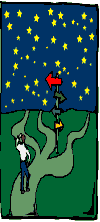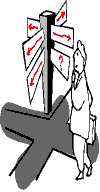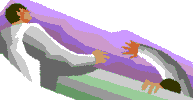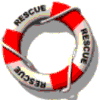From Crisis to Transformation
part 2: holistic view of an FMD epidemic
FMD Crisis in UK - old adversary returns with vengeance!
And all paths were overgrown
When the priests of pride said "There is no other way"
I tilled the sorrows of stone
(Dante's Prayer)
Foot and mouth disease (FMD) has, quite literally, "plagued" Britain since at least the early nineteenth century, if not earlier. Unlike more major diseases, such as rabies, rinderpest and pleuropneumonia, it has proved very resistant to our techniques of eradication and exclusion. The 20 year period of freedom (up to the epidemic of 2001) and the 34 years without a major FMD epidemic have been quite unprecedented, a tribute to late-twentieth-century veterinary knowledge and skill.
What is worrying however, is that the last two epidemics have been the worst on record. Also, as world trade, international travel and intensive farming systems have proliferated, the difficulties and costs of excluding FMD virus from Great Britain have increased.

- intensify existing strategies for excluding the virus
- abandon national and international attempts to control FMD
- develop new technology for controlling FMD virus
- develop a way of "living with" the virus
The FMD epidemic of 2001 tells us that intensifying existing controls is a very expensive option. The agricultural, economic, environmental, legal, political, social and ethical trends in society are clearly obstructing the old-fashioned "stamping out" (eradication by slaughter) techniques for FMD. Also, we are facing a new (to Britain) Type O Pan-Asia strain of FMD virus which has great capacity for spread and for inapparent infection of sheep. A golden rule of expensive (in the widest sense of the word) eradication programmes is that there must be a low risk of re-entry of the infection. This is clearly not the case with the Pan-Asia FMD strain - it is spreading world-wide plus international trade and travel are still growing.
Completely abandoning national and international attempts to control the spread of FMD is not a viable option as long as many countries remain free of the virus. FMD-free countries will naturally wish to hold onto a valuable disease-freedom asset as long as possible.
New technology is likely to come to the rescue of FMD-control programmes eventually. Research into marker vaccines, improved diagnostic tests and antiviral agents is underway. This important research will be further boosted by the 2001 FMD epidemic in Europe. Nations around the world have been shocked by the speed of virus spread in the U.K., by the immensity of the problem of subclinical infection in sheep, and by the growing twenty-first century obstacles to twentieth-century eradication techniques.
Living with the virus was never a serious political or "veterinary establishment" option for the United Kingdom in 2001. The costs of this rigid adherence to national prestige, veterinary dogma and international status have been enormous! Wide-ranging and "domino effect" adverse consequences to the U.K. economy, environment, public health (mental and physical), faith in government and national and international esteem are still emerging. There was little doubt before this epidemic, and even less afterwards, that applying slaughter and depopulation policies to a virus that is both endemic and spreading out-of-control is very unlikely to be cost-effective!
Slaughter and depopulation is an important option for controlling a limited outbreak of infectious disease. The United Kingdom did not have the flexibility, self-confidence and imagination (vision) to abandon a pure "stamping out" approach when it was clearly not working and the cost to the nation (in the widest sense) was spiralling into the stratosphere.
From a holistic point of view, there is no point in wallowing in blame, retribution or self-recrimination. What has happened has happened, and it is all part of the inexorable rhythms of life. United Kingdom government, society and veterinary profession flowed into this awful situation.

- avoid pain by denying, diverting from, or trying to forget this terrible trauma
- regain a sense of "control" by increased restrictions to prevent recurrence
- remain stuck in national dis-ease by wallowing in blame, guilt, misery
- gain knowledge, wisdom, power and healing from understanding the dynamics of our descent into dis-ease
From the holistic practitioner's viewpoint, reluctance to learn and grow is a valid, if rather boring, choice. It means that there is not yet enough suffering (dis-ease), or conscious awareness of possibilities, for evolution out of this inefficient pattern of energy flow. The path of healing and growing is often more uncomfortable, in the short term, than continuing to suffer (dis-ease). However, suffering is a form of energy which, when it grows to a certain critical level, will have a power of its own that can disrupt, no matter how traumatically and non-constructively, a stuck pattern of behaviour.

FMD Consequences in UK - A Nation in Grief?
As I open out my hand
Precious time - Time for Healing
the beauty of this land
(hear this song)
The reductionist approach to Foot and Mouth Disease (FMD) served the United Kingdom well over a period of 34 years - the country's last great epidemic of FMD was in 1967/8.
But many people in the United Kingdom believe that the established "developed country" approach to FMD blatantly failed in the epidemic of 2001. In fact we appear to be moving through the characteristic stages of a "loss and grief" experience, such as:



Grief experts warn us of the painful consequences of gettting stuck at a particular phase of a "loss and grief" process. The probability is that many people in the U.K. will prefer to get stuck (forget) the bad experience of FMD as quickly as possible - until the stuck behaviour pattern re-emerges in another disaster! For example, many of the lessons of the 1967 FMD epidemic were not applied in the 2001 epidemic!
So how can we move on from the "downward spiral", negative emotion, phase of grief into the upward, healing (growth and reconstruction) phase of:
In other words - how do we move from Crisis to Transformation?
Perhaps this is just the right moment for holistic medicine's healing contribution....
The three components of transformation
- Purification - letting go of behaviour, beliefs, perceptions that no longer work
- Awakening - bringing unconscious dynamics of the situation into consciousness
- Creative reconstruction - necessity is the mother of invention!
Negative pleasure
I am grateful to Barbara Brennan for opening my eyes to the addictive power of 'negative pleasure'. Negative pleasure is when we dump our negative feelings on others (e.g. in blaming or vilification). Another form of 'negative pleasure' is when when we suck energy (resources, support, sympathy) from other people by identifying with negative emotions, as when we take on the role of 'victim'. Negative pleasure dramas are rather like urinating into the wind - there is a short-lived sense of relief, but coupled with a persistent feeling of messiness and inadequacy. Like urinating into the wind, negative pleasure is not intrinsically bad or wrong, just not a wise way to live on a regular basis. Unfortunately, negative pleasure addiction is widespread in British society just now (see below).
Compassion
Our first step away from a negative or disassociated view of a crisis is to contact the grace of compassion. If an emotional or intellectual "mind-set" of blame, pain, shame or guilt is viewed from a compassionate standpoint, it soon begins to dissolve. Compassion can be accessed by realising that, behind a brave facade, the other people are suffering too.
We all do our best, no matter how unwise or inefficient. Our "best" is based on our past experience, plus a perception of the optimum balance between self- and other- interest. The only possible crime is repeating our errors, but even in this situation it may be that no one has yet required us to take responsibility!
We have to be willing to let go of the illusory benefits of holding-on to negativity and recrimination. Illusory gains can flow, for example, from the self-aggrandizing power of anger, the martyrdom of self-pity, or the superiority of self-righteousness. As the saying goes:
Forgiveness
Wallowing in the transient benefits of blame, defensiveness, guilt or resentment can only block or delay the natural cycle of learning, healing and reconstruction.
Forgiveness does not mean that we must passively let the same errors or ignorance happen again. At best it means "giving another chance" and "There but for the grace of God go I", at worst it means simply that we refuse to burden ourselves by continuing to bear ill-will. There is a widespread belief amongst holistic practitioners that long-term harbouring of powerful negative emotions leads to somatisation as physical illness.
Reflection All of us involved in a disease crisis (even if our involvement was very peripheral or indirect such as just talking or writing about the situation) can gain wisdom and skill from a structured reflective process, such as this one...
The Upstream/Downstream concept of disease control was originated by J.B. McKinlay in 1979. It is a specific implementation of the all things are connected principle. I would like to extend and illustrate it with a story... A Ministry of Agriculture official (MAO) went to a river to make a health and safety risk assessment... The kindly MAO dived into the river, pulled the fast-sinking farmer out and gave him a dry clothes subsidy form (Form X/896ZK3/2001/c) to fill in. The lady farmer was extracted from the river and given a subsidy form. Before the necessary paperwork could be completed there was yet another call from those evil waters, as another farmer flailed around, in danger of sinking. The MAO was becoming a little demotivated now, but bravely plunged to the rescue once again.
Eventually, after much suffering and fruitless expenditure of resources, the MOA said "I wonder what is happening upstream? - are farmers sliding in through carelessness, is there insufficient (riverbank) support, or is someone pushing them in?".
However, at this point, under intense media pressure, the Government decided that firm action must be taken, so a new order was passed - The "Drowning Farmers Aid (lifejackets provision) Order 2001". Under this aid package , all farmers upstream of the CRISIS ZONE were issued with free lifejackets (subject to submission of a 5-page application form and their last three years of audited business accounts).
These lifejackets ensured that farmers falling into the river were safely supported. While presenting this action to the nation, on TV, the Minister added that as a measure of how seriously the Government viewed the crisis, they were also allocating a large sum of taxpayers' money to the building of a high profile rescue platform across the river at the CRISIS ZONE, so that if farmers should fall in the water upstream (now supported by their lifejackets), they could easily climb out again.
The farmers found that wearing the lifejackets all the time and filling in all the related financial and statistical report forms was quite stressful. But worse - much worse - was to come!
Unfortunately, the Government, under intense media pressure to take immediate crisis action, had neglected to consider the downstream consequences of their aid package. The high profile rescue platform blocked the passage of food barges transporting produce from the farmers upstream of the CRISIS ZONE to the city of consumers, downstream of the CRISIS ZONE.
Food now had to be transported by a longer, more expensive route. Consumers were not prepared to pay the higher prices, so they bought more imported food. The upstream farmers had to take a reduced profit margin. The hardship of this added to the stress of the farmers - some even took off their lifejackets and suicidally hurled themselves into the river. Parliament was forced to approve a new order - The "Farmer Stress (quitting and suicide) Prevention Order 2001". Under the provisions of section 4, sub-section 3b, papragraph 27 of this this compensation package, farmers were relieved of the stressful task of trying to produce food and would be paid instead for alternative work - the filling in of Government forms.
UK Foot and mouth disease controls in the period from February to July 2001 stopped all exports and disrupted internal marketing of millions of young sheep. These sheep accumulated on farms all over Britain despite high prices for sheep meat in the shops. FMD regulations and bureaucracy increased marketing and abattoir costs. Delayed marketing, arising from FMD movement bans for a time, increased farmers' costs. Another contributory factor increasing the price of sheep meat was the expensive measures in place as a result of BSE regulations. So sheep accumulated on farms, often lacking resources to maintain them, while many consumers were not able to afford to buy meat in the shops.
Models of State Veterinary Medicine can be assessed according to their position on a spectrum from "Bad Shepherd" at one extreme to "Good Shepherd" at the other...
The sheep stumble blindly forward to their allocated nourishment, urged on by the "legal dogs" which intimidate them and vulnerable to the shepherd's ignorance and errors. The shepherd is all-powerful, but has a rather narrow life experience and is much feared by the sheep.
However, the shepherd has the "final say" in decisions, because the shepherd carries wider responsibilites and must take a wider view than just the immediate desires of the flock. The shepherd enjoys living with the sheep, who are treated as sentient beings - possibly even as equals! The sheep adore the shepherd most of the time, except when the flock's short-sighted convenience or selfish desires and freedoms are compromised.
The "Bad Shepherd / Good Shepherd" model is of course a great over-simplification, but it does give food for thought, and leads us to consider next...
As society changes and evolves over time it puts great pressure on the operating energy pattern (culture) of organisations. If the culture of an organisation does not change with the times it becomes increasingly inefficient and ineffective (dis-eased). Those members who experience themselves as having low power (energy control) become particularly vulnerable to stress, low motivation or apathy.
Holistic principles require that for organisational "ease", energy must be well-distributed and free to flow. For example, power, control, flexibility and intiative must not be concentrated at the top of the management tree. Also, there must be a free flow of communication energy, particularly where internecine and territorial disputes are concerned.
A healthy organisation maximises the contribution of its members. This means encouraging not just technical skills, but also stress-management and problem-solving skills. Self-awareness and personal development (maturity, wisdom) are also part of the energetic synergy that can lead from dis-ease to health. Health means not just absence of significant dis-ease, but also a sense of well-being (job satisfaction).
Research surveys have demonstrated that a key element in job satisfaction is that an employee feels valued. Bureaucratic organisations, which trust paper more than employees, are on the path of dis-ease. If employees are not trustworthy, this brings us back to the
energetic value of training in self-awareness and personal development. The United Kingdom FMD crisis reflected the country's alarming process of progressive erosion of democracy.
The foundations of a healthy democracy are openness, honesty, integrity and power-sharing. During the FMD crisis we saw a catalogue of misinformation and even downright public lying from key people in government.
Politics is widely regarded as an entertainment sport in the UK, and a very aggressive combative sport at that. Electing leaders who we can vilify, and who vilify each other has become a national preoccupation - an opportunity, perhaps, to express all that self-generated negative energy. The cost is that this "locked" energy pattern of national dis-ease is likely to be repeated - more national disasters can be expected!
What are the dynamics of this corruption of democratic ease and efficiency in a nation that was once a world-wide model for democracy?
Fear of media vilification may account for the inflexibility which some of us believe has characterised the design and implementation of UK FMD controls.
Spin-doctoring is an attempt to protect the authority and reputation of government from media violations such as "demonisation", but in fact often backfires into a distortion of the original government information and a consequent enhancement of media and public distrust. In the FMD crisis we have also seen an insensitivity to the interests of many non-farming sections of the community which were adversely affected by stringent and prolonged FMD controls. For example, consumers dis-eased by ethical issues and meat supply disruption, farm animal pet owners, rare breed and zoo animal owners, countryside footpath users and the huge British tourism industry. Tens of thousands of people lost their jobs or businesses as a result of FMD controls.
This disenfranchising of many of the population was the result of a narrowly-based reductionist approach to FMD, combined with the inflexibility dynamic referrred to above. In Sitting in the Fire Arnold Mindell illustrates the value of harnessing the energy of society's conflict and diversity for the process of evolutionary transformation.
Democracy is intended to empower people, but one of the dis-ease dynamics in British society is that people are increasingly disempowered by a mountain of complex legislation, regulations and bureaucracy. This legal and bureaucratic monster is beyond the capacity of any individual to be familiar with. Interminable delays (up to a week) occurred in destroying animals infected with FMD virus and even greater delays (up to 10 days) in disposing of infected carcases.
Another possible source of "upstream" governmental dis-ease is the apparent reluctance of politicians to manage the senior civil servants who administer government. Politicians come and go, but senior civil servants tend to be in office for most or all of a lifetime. Politicians are directly accountable to the voters, but is there enough accountability for senior civil servants? If not, then in holistic terms, there can be a block of the feedback energy from personal actions to personal consequences. If politicians are restricted to authorising spending (based on civil service advice) and presenting events favourably to the voters, then democracy is dis-eased.
Law and bureaucracy are intended to be the tools of a democratic society, but we have reached a point where this energy-sapping monstrosity is seriously debilitating the control of epidemic disease. The United Kingdom was woefully unprepared for the epidemic of FMD and many of us believe that over-centralisation and over-politicisation of both decision-making and resource allocation were major factors in this dis-ease. In holistic terms, this would be expressed as an unhealthy diversion (dis-ease) of healthily-distributed energy-flows (ease) into a restricted number of congested central pathways, excessively distant from the point of need.
In addition to draining time, money and morale in the FMD epidemic, a morass of regulations and consultative procedures reduced the flexibility of experienced and trained people, e.g. state veterinarians in the "front line" of epidemic control, to take speedy action and to make reasonable, sensible exceptions to the dictates of scientists and officials at "head office". Insufficient trusting of people (as opposed to trusting paperwork and rules), insufficient willingness to take risks, and insufficient delegation of power and responsibility has become a major source of dis-ease!
One huge transformation in evidence was the extensive reporting and documentation of events during this disease epidemic. Thanks to the growth of the Internet, an unprecedented, previously unimaginable, level of epidemic reporting was first seen during the UK outbreaks of classical swine fever (CSF) in 2000. In the FMD epidemic of 2001, this massive public, government and veterinary empowerment rose to dizzy new heights.
Communication and information are important sources of empowerment for the democratic process. The Internet also greatly facilitated the Ministry of Agriculture (MAFF) efforts to communicate disease control information. As in the 2000 CSF epidemic, MAFF was slow and initially limited in its use of the Internet but, stimulated partly by the example of independent veterinary and farming websites, the MAFF website became an increasingly valuable source of useful information, although erratic reporting of events received some criticism.
Another transformational process that was in evidence during the epidemic was a trend towards a more connected and sensitive relationship with farm animals as sentient beings, rather than as purely economic commodities. This trend was also in evidence in other European Union countries affected by, or threatened by, the spread of FMD virus. There was much reaction against mass slaughtering of uninfected animals, and an unprecedented pressure to use vaccination or isolation and treatment.
Over the last 30 years we have seen an increasing application of industrial mass production techniques to the farming of livestock. The abundance and low cost of livestock products resulting from intensification has been welcome. However, there is a growing appreciation that industrial production approaches may have gone too far. Lack of sensitivity to animals, particularly to the needs of individuals, is not conducive to good disease resistance. Dense populations and inadequate provision of skilled stockpersons also increase the problem of epidemic disease. It has been said that death is the last taboo in western countries - the one subject that we avoid talking or even thinking about. The one aspect of reality that most of us have absolutely no desire to confront!
Fortunately, lengthening lifespans and the medicalisation of dying have given us a certain amount of protection in this regard. Even when it comes to our huge national appetite for meat, most of us, even many farmers, rarely confront the actual killing or carcases of the animals we consume. The UK FMD epidemic changed all that - there was a profusion of images of destruction of life that could not be dismissed!
No doubt this horrific confrontation - including the site of thousands of carcases piled on incineration pyres or dumped unceremonially into huge burial pits - fired much of the emotional dis-ease, anger and blame, that many of us experienced. Some people have been forced to re-evaluate their meat-eating. One newspaper survey claimed that a million UK people decided to become vegetarian in response to this horrendous assault on their naive sensibilities.
There is a Buddhist tradition wherein monks are encouraged to spend days and nights meditating in cemeteries or alongside corpses, and to visualise their own death and corporeal degeneration. These might seem rather necrophilic practices to the casual observer, but they are based on the ancient reality and wisdom of the cycle of life. How can we fully value the life-forms around us or the powerful life-forces within us, until we accept that they are just on loan to us for a limited time?
Similarly, in Europe, there is an ancient dramatic art tradition of mummery in which the harsh realities of life and death are acted out. Mummery developed as a vehicle for social cohesion in isolated rural communities.
Within the pain of those disturbing, clinging, images of FMD-control animal deaths - the horrific destruction and waste of millions of lives - there are, from a holistic point of view, the seeds of hope, joy and transformation . It has been said that no-one really values life until they have confronted the reality of losing it. We see this, for example, in many people who have faced life-threatening illness or disaster. Terrifying brushes with death and loss can open the door to a new perspective on life - to what really matters, to who really matters, to what we want to be remembered for, and even to... who we want to grow into ...while there is still time.
Death and tragedy, especially when these events are perceived as violent and unnecessary, are harsh realities that we can never fully avoid. If we can find the courage to face them, we may find that their horror and our vulnerability are the glue that connects us to each other and to the other life-forms with whom we share this amazing, delightful and wondrous planet.
Confrontations with disease, death and tragedy in animals can serve to remind us of our own exquisite vulnerability in a world that is hazardous and despite our best efforts, sometimes unbelievably, inescapably, cruel. We can withdraw from these harsh realities into a world of isolated, fear-filled misery, or withdraw into a world of distractions, denials or empty political promises.
Another option is to continue on the path of increasing our society's investment in constructing increasingly elaborate (bureaucratic and regulatory) fear-driven illusions of control and safety. Or we can divert more of our energy into creativity-driven, love-driven, wisdom-driven, flexible agendas which prioritise empowering people and enriching life on earth. For example, the European Union invests increasingly in regulation of animal health and welfare. This is not a bad thing, but is there a balance between promotion and regulation? In the field of human health & welfare, proactive promotional work is now well developed.
Must animal health and welfare regulations be drawn up by remote "priesthoods" of scientific experts? Or could, as Arnold Mindell suggests, much more be achieved by co-creative scientist and stakeholder (interested parties) dialogue (not to be confused with stakeholder "consultation"). Can the rising tide of ruthless political promotion by self-interested groups be checked by some courageous initiatives into a mutual meeting and co-transformation of hearts and minds?
There comes a point when bureacracy-driven, regulation-driven, political-power-driven, rigid control agendas obstruct and destroy more life than they preserve. Is this the main lesson from this out-of-control disease epidemic? Is this the lesson of joyous, empowering transformation from a fear-driven, inflexible, disease-control paradigm that, in human suicides alone, matched the mortality rate of vCJD (human BSE)?
The views expressed in this monograph are the personal ideas and perceptions of the author. Author: Michael J. Meredith
practical reflection skills
The Upstream / Downstream Concept

As the MAO sat on the river bank writing the report, a farmer came floating down the river, struggling to keep his head above water.

The farmer was grateful for being rescued and the MOA was happy to have been of help. As the MAO was documenting the rescue for the benefit of senior management, government auditors and the European Commission, there was a distressed shout from the river, where another farmer (a lady this time) was in desperate difficulties.

 And so the sorry saga continued. Farmer after farmer was rescued and the paperwork amassed to mountainous proportions. UK and EU taxpayers dug ever deeper in their pockets to finance the constant rescues.
And so the sorry saga continued. Farmer after farmer was rescued and the paperwork amassed to mountainous proportions. UK and EU taxpayers dug ever deeper in their pockets to finance the constant rescues.
An order (The "Farmers Lack of Support & Unable to Swim Order 2001") was laid before Parliament designating this stretch of river to be an official "CRISIS ZONE". More Ministry staff were brought in to help and more forests cut down to supply the paperwork.
 The MAO, once happy to be of help to the struggling farmers, became increasingly tired and disillusioned. "What is the point?" - especially since the farmers were getting pretty fed up to, and no longer quite so grateful. Some of them had been "ducked" on several occasions now, while others lived in constant fear of being the next in line.
The MAO, once happy to be of help to the struggling farmers, became increasingly tired and disillusioned. "What is the point?" - especially since the farmers were getting pretty fed up to, and no longer quite so grateful. Some of them had been "ducked" on several occasions now, while others lived in constant fear of being the next in line.
Downstream Consequences of FMD controls
Some practical examples of upstream factors in national disease control follow... State Disease Control Models:
State Disease Control Models:
Bad Shepherd / No Shepherd / Good ShepherdThe Bad Shepherd
The "Bad Shepherd" State Veterinary Service (SVS) is one where the SVS forcibly drives the sheep flock (farmers) to wherever the shepherd decides they should go - a direction which meets the needs of the shepherd, and the shepherd's political flockmasters. There is little consideration for the needs of the sheep, who, after all, are only "mindless wool & political meat" on legs. However, the sheep are kept safe by rigidly-fenced boundaries.
No Shepherd
The "No Shepherd" State Veterinary Service (SVS) is one where the sheep flock is left to roam freely the unfenced pastures - sometimes overgrazing pasture, damaging feeding and watering places and vulnerable to attack, disease or injury from inside or outside their territory. The shepherd has minimal skill and minimal involvement - sheep are expected to "fend for themselves" with no organised or structured flock co-operation. Minimal demands are made on the shepherd, but it is a hard and risky lifestyle for the sheep. Not only does the shepherd have little care for the sheep, but the sheep also have little care for the shepherd.
The Good Shepherd
The "Good Shepherd" State Veterinary Service (SVS) is one where the SVS
leads the flock (as in biblical times). The shepherd is skilful and knows how to form with the sheep a co-operative relationship of mutual trust and respect. The shepherd enjoys the lifestyle and learns much natural wisdom from the sheep. The flock move in directions initiated by the shepherd but supported by the sheep - decisions influenced by their joint skill and experience.
Dis-ease in Organisational Culture
Dis-ease in the Democratic Process
 Why do the British voters repeatedly elect, and even re-elect, politicians who they know will weave extravagant promises, then disappoint and deceive? Perhaps it is a symptom of a depressed nation. Depressed nations, like depressed people, have low self-esteem and tolerate poor service - from a gloomy perspective, nothing better can be envisaged! Plus there is the opportunity to fall into the alluring pit of negative pleasure addiction (see above).
Why do the British voters repeatedly elect, and even re-elect, politicians who they know will weave extravagant promises, then disappoint and deceive? Perhaps it is a symptom of a depressed nation. Depressed nations, like depressed people, have low self-esteem and tolerate poor service - from a gloomy perspective, nothing better can be envisaged! Plus there is the opportunity to fall into the alluring pit of negative pleasure addiction (see above).
 Well, media skill and power has grown to a point where politicians and state veterinarians are very vulnerable to harsh public scrutiny and criticism. Responsibility of some sections of the media appears to be quite meagre - sensational stories, no matter how exaggerated or unbalanced, sell very well. Media accountability is largely limited to situations where a major and legally provable abuse has taken place. Media consumers seem to prefer a dramatic and emotive story to a factual or balanced one. This situation bears high costs in terms of public trust and national self-esteem. Media activity, under the guise of stimulating entertainment, sometimes becomes a saga of national self-destructiveness.
Well, media skill and power has grown to a point where politicians and state veterinarians are very vulnerable to harsh public scrutiny and criticism. Responsibility of some sections of the media appears to be quite meagre - sensational stories, no matter how exaggerated or unbalanced, sell very well. Media accountability is largely limited to situations where a major and legally provable abuse has taken place. Media consumers seem to prefer a dramatic and emotive story to a factual or balanced one. This situation bears high costs in terms of public trust and national self-esteem. Media activity, under the guise of stimulating entertainment, sometimes becomes a saga of national self-destructiveness.
 The British media are increasingly ruthless, relentless and unbalanced in their exposure, judgement and vilification of any Government figure who commits an error or even simply betrays a change of mind or change in policy!
The British media are increasingly ruthless, relentless and unbalanced in their exposure, judgement and vilification of any Government figure who commits an error or even simply betrays a change of mind or change in policy!
 Fear of the media is undoubtedly a factor in the withholding and delaying of epidemic information. Another development from fear of the media,is the "spin-doctoring" distortion and manipulation of government information which many of us have perceived during the epidemic. Public relations consultants and media experts ("spin-doctors") have become major players in the UK democratic process.
Fear of the media is undoubtedly a factor in the withholding and delaying of epidemic information. Another development from fear of the media,is the "spin-doctoring" distortion and manipulation of government information which many of us have perceived during the epidemic. Public relations consultants and media experts ("spin-doctors") have become major players in the UK democratic process.
Constructive Transformation in the Epidemic Crisis
(Dadi Janki)
 The YinYang holistic symbol tells us that no situation is entirely negative. Within the dark there is always a small ray of light!
The YinYang holistic symbol tells us that no situation is entirely negative. Within the dark there is always a small ray of light!
Was there any positive evidence of constructive transformation in the UK's FMD crisis?
 Thanks largely to the Internet, a wider range than ever of media, organisations and individuals contributed to the reporting and analysis of the 2001 FMD epidemic. Much of this reporting was more freely and widely available than ever before.
Thanks largely to the Internet, a wider range than ever of media, organisations and individuals contributed to the reporting and analysis of the 2001 FMD epidemic. Much of this reporting was more freely and widely available than ever before.

References
Acknowledgements
I would like to thank the following colleagues for their helpful comments and suggestions on the manuscript:
Michael Chapman, MRCVS
Dr. Murray Corke, MRCVS, Dept. of Clinical Veterinary Medicine, University of Cambridge
Pat Gardiner, raconteur, writer and smallholder, Norfolk
Dr. Richard Kirkden, Animal Welfare Group, University of Cambridge
BSc (physiol) BVetMed MA PhD MRCVS

Go to: Title & Music Overview & Index
Part 1 Notes & Resources
Recent News of FMD
History of UK epidemic
FMD resources